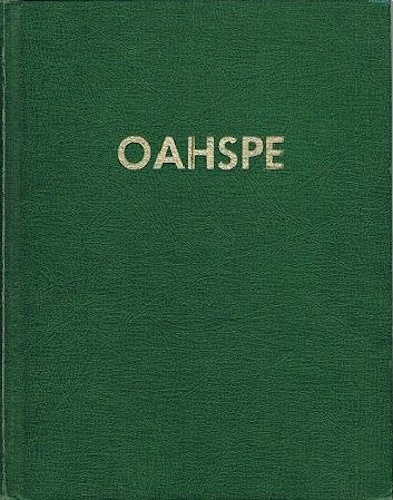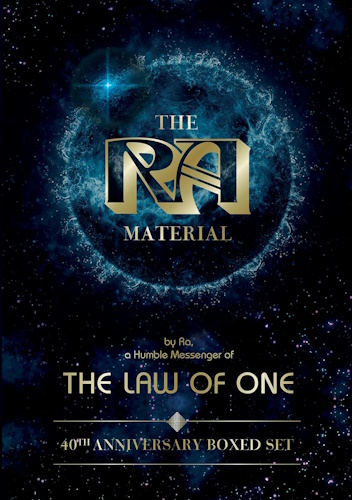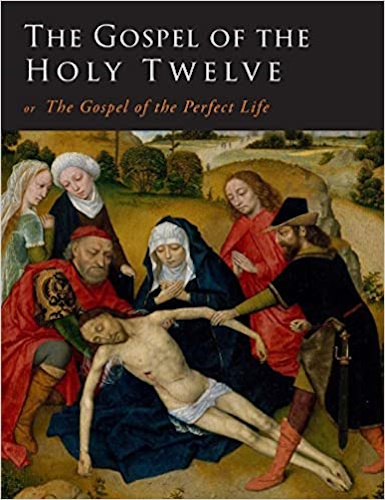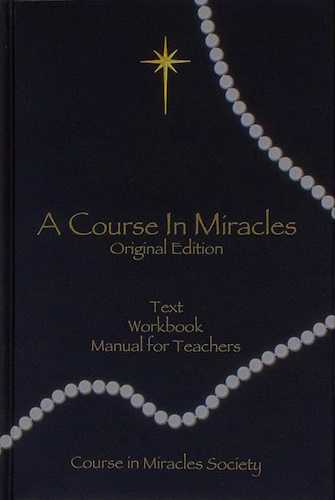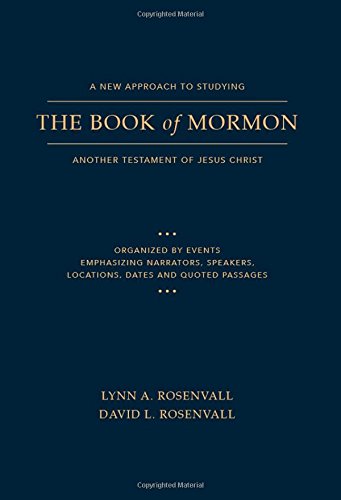
![]()
![]()
Book of Wars Against Jehovih
Chapter XLIII
1. SUDGA, after assuming a heaven unto himself, moved it over the Nua Mountains and called it Hridat, in which place he had eight thousand million angel slaves, after the same manner as Te-in's. Sudga's capital city, Sowachissa, his highest heavenly seat, was modeled after the fashion of Sanc-tu, De'yus' heavenly place in Hored, at the time of its greatest magnificence.
2. The capital house of Sudga was made of precious stones and gems, the work of thousands of millions of angels for many years. And when Hored was pillaged, prior to De'yus' being cast into hell, millions of its most precious ornaments were stolen and brought to Hridat. The streets of Hridat were paved with precious stones; and an arena surrounded the palace on every side, set with crystals of every shade and color, and of every conceivable manner of workmanship. On the borders of the arena stood five hundred million sentinels, arrayed in gorgeousness such as only Gods had looked upon. Inside the line of sentinels were one million pillars of fire, kept brilliant day and night, by the toil of five hundred million slaves. Inside the line of the pillars of fire were one million marshals, so arrayed in splendor one
p. 432
could scarce look upon them. These were watch and watch, with two other groups of one million each, and they stood watch eight hours each.
3. None but the vice-Gods and the high marshals could cross the arena to the palace, walking, but must crawl on their bellies; and for every length crawled, they must kiss the pavement and recite an anthem of praise to Sudga, who now took both names, Sudga and Dyaus. Neither must any one repeat the same anthem twice, but it must be a new anthem for each and every length of the person. For a tall person, a thousand lengths were required, from the line of marshals to the palace, a thousand anthems. So that only the few, as compared to the millions, ever laid eyes on the throne of Sudga. And after they so beheld him on the throne, for they were only permitted to gaze but once on him, and that at a great distance, and amidst such a sea of fire they scarce could see him, then they must re-crawl back again to the place of beginning, again reciting another thousand anthems.
4. Which made Sudga almost inaccessible, and permitted only such as were favored to even look upon him, which with the ignorant is a great power.
5. When Ahura came to the capital and sent word to Sudga who he was, praying audience, Sudga gave orders to admit him, commanding Ahura to walk upright into his presence, along with the vice-Gods. Accordingly, in this manner Ahura came before Sudga, and saluted in LOVE AND ESTEEM, answered by Sudga in FRIENDSHIP OF OLD. The latter at once commanded privacy, and so all others withdrew, and Ahura and Sudga went up and sat on the throne.
6. Sudga said: Because thou hast come to see me I am overflowing with joy. Because I know thou hast come to admonish me for my philosophy and the manner of my dominions, I respect thee. Because thou didst once try to found a kingdom of thine own, and failed, I sympathize with thee; but because thou wentest back on thyself and accepted Jehovih, and so was rescued from thy peril, I commiserate thee.
7. Ahura said: To hear thy gifted tongue once more is my great joy. To know that no misfortune was in store for thee and thy kingdom would give me great delight. Because I love thee, and the people of thy mighty, heavenly kingdom, I have come to admonish thee and plead for Jehovih's sake. As for myself, I have found that to cast all my cares on Him, and then turn in and work hard for others, these two things give me the greatest happiness.
8. Sudga said: Can a brave man justly cast his cares upon another? Was not thyself given to thyself for thyself? If so, thou desirest none to work for thee? If so, how hast thou a right to work for others? If thou prevent them working out their own destiny, wrongest not thou them? Moreover, thou sayest: To cast thy cares on Jehovih, and to work hard for others, these two give thee the greatest happiness: Wherefore, art thou not selfish to work for thine own happiness? For is not this what I am doing for myself in mine own way.
9. Ahura said: Grant all thy arguments, O Sudga, where shall we find the measure of righteous works but in the sum of great results? For you or I to be happy, that is little; for a million angels to be happy, that is little. But when we put two kingdoms alongside, and they be the same size, and have the same number of inhabitants, is it not just that we weigh them in their whole measure to find which of the two kingdoms hath the greatest number of happy souls? Would not this be a better method of arriving at the highest philosophy?
10. Sudga said: Yea, that would be higher than logic, higher than reason. That would be the foundation of a sound theory.
11. Ahura said: And have we not found, both in heaven and earth, that all kingdoms that are overthrown have the cause of their fall in the unhappiness and disaffection of the ignorant. As soon as the masses begin to be in unrest, the rulers apply vigorous measures to repress them, but it is only adding fuel to the fire; it deadeneth it awhile, but only to have it burst forth more violently afterward.
12. Sudga said: Thou reasonest well, O Ahura; go on. Ahura said: How, then, shall we determine the happiness of two kingdoms, in order to determine which hath the greater happiness? Are not revolts evidence of unhappiness? Hear me, then, O Sudga; where, in all the Jehovihian heavens, hath there ever been a revolt? And on the earth, where have the Jehovihians, the Faithists, rebelled against their rulers? Behold, in the far-off etherean heavens, the Nirvanian fields, hath never been any God or Chief environed in tortures. As for my own kingdom, my people will not rebel against me, nor need I fortify myself against disaster.
13. Sudga said: Thou art wise, O Ahura. The only way to judge a kingdom's
p. 433
happiness is by the peace and contentment and civility of its people toward one another, and by the confidence betwixt the ruler and the ruled. He who hath to guard himself liveth on the eve of destruction of his kingdom and himself. And yet, O Ahura, remember this: the Jehovihians of heaven and earth are high raised ere they become such; any one can be a ruler for them, for they know righteousness. But I have to deal with druks and drujas. How, then, canst thou compare my kingdoms with the Nirvanian kingdoms?
14. Ahura said: Alas, O Sudga, I fear my arguments are void before thee. Thou showest me that the line betwixt selfishness and unselfishness is finer than a spider's web. Even Gods cannot distinguish it. And yet, behold, there was a time when I said: I will be a mighty God, and bow not to the Unknown that brought me into being. For this I labored long and hard; the responsibility of my kingdom finally encroached upon my happiness. Long after that I put away all responsibility, and made myself a servant to Jehovih. Then a new happiness came upon me, even when I had nothing that was mine in heaven and earth. This is also unknowable to me; it is within my members as a new tree of delight. This it is that I would tell thee of, but I cannot find it. It flieth not away; it baffleth words, even as a description of the Great Spirit is void because of His wondrous majesty. Such is the joy of His service that even Gods and angels cannot describe it. With its growth we look famine in the face and weep not; we see falling ji'ay and fear not; with the ebb and flow of the tide of Jehovih's works we float as one with Him, with a comprehensive joy.
15. Sudga said: To hear thy voice is joy to me; to not hear thee is great sorrow. Behold, I will consider thy words of wisdom. In thy far-off place I will come in remembrance and love to thee.
16. Thus ended the interview, and Sudga signaled his vice-Gods and high marshal to come; whereat he saluted Ahura in the Sign of CRAFT, and Ahura answered him in the Sign, TIME.
And then Ahura, betwixt the vice-Gods, led by the high marshal, departed, passed beyond the arena, where the vice-Gods and high marshal gave him into the charge of the marshal hosts, who conducted him beyond the line of sentinels, where Ahura joined his own attendants and went with them into his otevan, and set sail for Agho'aden, Osiris' heavenly place, which had been over Parsi'e, but was now moved over Arabin'ya.
-
Urantia Book, 44:0.11 - The Celestial Artisans
Never in your long ascendancy will you lose the power to recognize your associates of former existences. Always, as you ascend inward in the scale of life, will you retain the ability to recognize and fraternize with the fellow beings of your previous and lower levels of experience. Each new translation or resurrection will add one more group of spirit beings to your vision range without in the least depriving you of the ability to recognize your friends and fellows of former estates.
-
Princess Bride 1987 Wallace Shawn (Vizzini) and Mandy Patinkin (Inigo Montoya)
Vizzini: HE DIDN'T FALL? INCONCEIVABLE.
Inigo Montoya: You keep using that word. I do not think it means what you think it means. -
Urantia Book, 117:4.14 - The Finite God
And here is mystery: The more closely man approaches God through love, the greater the reality -- actuality -- of that man. The more man withdraws from God, the more nearly he approaches nonreality -- cessation of existence. When man consecrates his will to the doing of the Father's will, when man gives God all that he has, then does God make that man more than he is.
-
Urantia Book, 167:7.4 - The Talk About Angels
"And do you not remember that I said to you once before that, if you had your spiritual eyes anointed, you would then see the heavens opened and behold the angels of God ascending and descending? It is by the ministry of the angels that one world may be kept in touch with other worlds, for have I not repeatedly told you that I have other sheep not of this fold?"
-
Urantia Book, Foreword - 0:12.12 - The Trinities
But we know that there dwells within the human mind a fragment of God, and that there sojourns with the human soul the Spirit of Truth; and we further know that these spirit forces conspire to enable material man to grasp the reality of spiritual values and to comprehend the philosophy of universe meanings. But even more certainly we know that these spirits of the Divine Presence are able to assist man in the spiritual appropriation of all truth contributory to the enhancement of the ever-progressing reality of personal religious experience—God-consciousness.
-
Urantia Book, 1:4.3 - The Mystery Of God
When you are through down here, when your course has been run in temporary form on earth, when your trial trip in the flesh is finished, when the dust that composes the mortal tabernacle "returns to the earth whence it came"; then, it is revealed, the indwelling "Spirit shall return to God who gave it." There sojourns within each moral being of this planet a fragment of God, a part and parcel of divinity. It is not yet yours by right of possession, but it is designedly intended to be one with you if you survive the mortal existence.
-
Urantia Book, 1:4.1 - The Mystery Of God
And the greatest of all the unfathomable mysteries of God is the phenomenon of the divine indwelling of mortal minds. The manner in which the Universal Father sojourns with the creatures of time is the most profound of all universe mysteries; the divine presence in the mind of man is the mystery of mysteries.
-
Urantia Book, 1:4.6 - The Mystery Of God
To every spirit being and to every mortal creature in every sphere and on every world of the universe of universes, the Universal Father reveals all of his gracious and divine self that can be discerned or comprehended by such spirit beings and by such mortal creatures. God is no respecter of persons, either spiritual or material. The divine presence which any child of the universe enjoys at any given moment is limited only by the capacity of such a creature to receive and to discern the spirit actualities of the supermaterial world.
-
Urantia Book, 11:0.1 - The Eternal Isle Of Paradise
Paradise is the eternal center of the universe of universes and the abiding place of the Universal Father, the Eternal Son, the Infinite Spirit, and their divine co-ordinates and associates. This central Isle is the most gigantic organized body of cosmic reality in all the master universe. Paradise is a material sphere as well as a spiritual abode. All of the intelligent creation of the Universal Father is domiciled on material abodes; hence must the absolute controlling center also be material, literal. And again it should be reiterated that spirit things and spiritual beings are real.
-
Urantia Book, 50:6.4 - Planetary Culture
Culture presupposes quality of mind; culture cannot be enhanced unless mind is elevated. Superior intellect will seek a noble culture and find some way to attain such a goal. Inferior minds will spurn the highest culture even when presented to them ready-made.
-
Urantia Book, 54:1.6 - True And False Liberty
True liberty is the associate of genuine self-respect; false liberty is the consort of self-admiration. True liberty is the fruit of self-control; false liberty, the assumption of self-assertion. Self-control leads to altruistic service; self-admiration tends towards the exploitation of others for the selfish aggrandizement of such a mistaken individual as is willing to sacrifice righteous attainment for the sake of possessing unjust power over his fellow beings.
-
Urantia Book, 54:1.9 - True And False Liberty
How dare the self-willed creature encroach upon the rights of his fellows in the name of personal liberty when the Supreme Rulers of the universe stand back in merciful respect for these prerogatives of will and potentials of personality! No being, in the exercise of his supposed personal liberty, has a right to deprive any other being of those privileges of existence conferred by the Creators and duly respected by all their loyal associates, subordinates, and subjects.
-
Urantia Book, 54:1.8 - True And False Liberty
There is no error greater than that species of self-deception which leads intelligent beings to crave the exercise of power over other beings for the purpose of depriving these persons of their natural liberties. The golden rule of human fairness cries out against all such fraud, unfairness, selfishness, and unrighteousness.
